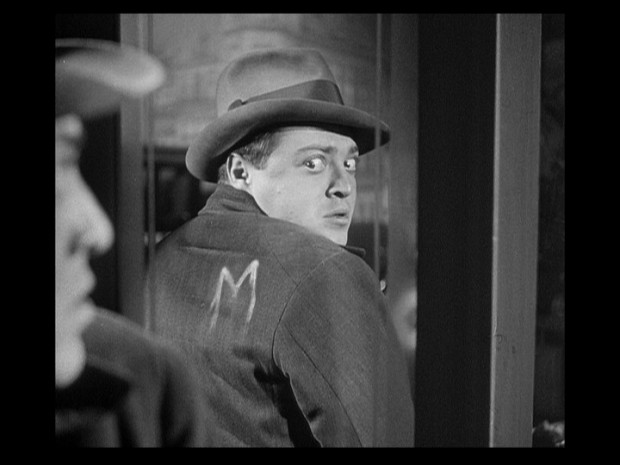You have no items in your cart. Want to get some nice things?
Go shoppingM is significant not just as a lesson in the craft and history of moviemaking, but as a timeless treatise on civilisation’s most disturbing and overlooked issues.

Peter Lorre is one of the most influential and overlooked actors who ever lived. Many will have unwittingly heard his unique Hungarian inflections mimicked on screen, whether it be in almost every animated film produced by Tim Burton or even in The Simpsons. Lorre’s creepy stare and odd accent have defined a generation of horror aficionados’ perception of the hapless henchman trope, while his modest supporting roles in several Hollywood classics – not least of all, perennial critics’ favourite Casablanca – have made him ubiquitous in any film lover’s collection. Therefore it is a very welcome thing for the BFI to mark the 50th anniversary of Lorre’s death with a season of his films.
The season begins with the film that launched Lorre’s international career: Fritz Lang’s M. This powerful and cutting-edge tale of a child murderer in the last days of Weimar Germany (it was made before Hitler came to power) has been gloriously restored by the BFI – and unlike the trimmed versions that have circulated on DVD for the past decade, this is probably as complete a version as you will ever see, with cleaned celluloid and crisp sound. For this reason alone, it should be sought out on the big screen.
But there’s more. M is not just a film for fans of Fritz Lang, Peter Lorre and German cinema. It always has been and remains a compellingly powerful and complex crime thriller. It takes its time to set the story: Lorre, despite being the iconic face of the film since its release, doesn’t appear until about half an hour into proceedings. Instead, the story concentrates on the impact that a wave of child killings have had on society. This unusually democratic approach combines the heart-wrenching with the humorous: where one moment we weep for the mothers who have lost their children, we find ourselves chuckling as the authorities plot to catch the culprit almost as ineptly as the criminal underworld gathers to get the man whose terror is ruining business.
This latter scene in particular reveals the deft slyness of Lang’s ability as a storyteller and craftsman. It is a groundbreaking sequence, intercutting between the committee of fat-cat officials and their ruthless gangster counterparts, using the fresh technology of recorded sound to have them finish each others’ sentences. The audience is at once amused by their similar frustrations, dazzled by the clever writing and moved by the actors’ convictions. All the while, we cannot help but notice the contrast between the criminals’ humble surroundings and the city officials’ luxurious meeting hall, swathed in smoke, leather and brandy. Throughout M, the inequalities of the Weimar era are shown but never commented on, as both rich and poor, criminal and lawmaker, man and woman are united by their horror at the heinous acts of one man. It seems that Lang migrated from the silent era to the sound stage with unparalleled ease.
However, M is equally Peter Lorre’s film as it is Fritz Lang’s. The actor is simply tremendous – selflessly portraying a monster who, thanks to Lorre’s inimitable ability to express pain and ooze evil, is surprisingly sympathetic as well as terrifying. This forms part of the film’s deliberate message. Lorre’s murderer is depicted as a compulsive killer who loses all control and memory of his actions, yet is aware enough to regret everything he does. At the film’s end, Lorre delivers one of the most powerful and pathetic speeches in cinema history – a clear demonstration of the ability that he possessed and that Hollywood would squander. This is followed by a lawyer’s impassioned command to hold only a sane man responsible for his crimes, and an accusation against the hypocrisy of the career criminals who pursue him. Ultimately M pulls the rug from under our feet: it is no simple condemnation of serial killers or criticism of class inequality, but a powerful plea for tempered judgement and fair treatment of humanity. Many films have since whistled a similar tune; none have done it so well.
The film ends on a haunting note I will not spoil here. I will simply recommend M with all my heart – not just as a film fanatic’s lesson in the craft and history of moviemaking, but as a timeless treatise on civilisation’s most disturbing and overlooked problems. M is dark, profound and unafraid to entertain, with startling currency in both filmic and thematic terms. Seize this opportunity to rediscover two of cinema’s most important and defining talents on the big screen.
The BFI’s Peter Lorre season opens with M on 5th September, 2014 at BFI Southbank, IFI Dublin and selected cinemas nationwide.

About Robin McConnell
Robin is an obsessive film fanatic and occasional person. When he is not watching films or editing Litro Film & Media he can be found writing and producing the Alltime channels on Youtube. He is often distracted by the need to write scripts and short stories.




